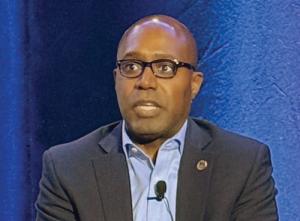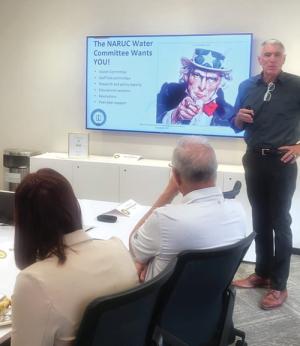NARUC
Jehmal Hudson is NARUC Second Vice President and a Commissioner at the Virginia State Corporation Commission. Paul Kjellander is PUF Senior Advisor and former Idaho PUC President.
NARUC held its 27th New Commissioner Regulatory Orientation on April 27-29 at its offices in Washington, D.C. NARUC also held its Chairs Council Conference at the same time.

NARUC Second Vice President and Virginia Commissioner Jehmal Hudson presided over the New Commissioner Regulatory Orientation, which educated them with information and resources to navigate an interconnected regulatory world. District of Columbia Chair Emile Thompson and Iowa Chair Erik Helland presided over the Chairs Council Conference, which educated them on administrative and regulatory functions, as well as helping build relationships.
PUF Senior Advisor Paul Kjellander met with two regulatory leaders on the importance of these educational meetings. He spoke with NARUC President and Georgia Commissioner Tricia Pridemore, as well as NARUC Second Vice President and Virginia Commissioner Jehmal Hudson.
PUF: You're a Commissioner and the Second Vice President of NARUC. One of the responsibilities of Second Vice President is helping new Commissioners. Talk about that role.
 North Carolina Commissioner Jeffrey Hughes was an instructor.
North Carolina Commissioner Jeffrey Hughes was an instructor.
Commissioner Jehmal Hudson: My role now is to be the main coordinator of the new Commissioners' regulatory orientation. This program provides a critical foundation for new top-level regulators entering an incredibly complex environment.
Regulation today is not just about setting fair rates. It's increasingly about managing cybersecurity risk, evaluating infrastructure investment needs, balancing affordability with innovation, and preparing for even more changes in the future.
Orientation offers new Commissioners the chance to learn directly from peers, understand the legal and policy frameworks that will help shape their work, and most importantly, build relationships that will last throughout their careers. It's about equipping Commissioners with the knowledge, tools, and networks they need to lead effectively.
PUF: Just coming off the new Commissioner orientation that is held once a year, talk about that and its value.
Commissioner Jehmal Hudson: The main focus of the orientation is education. New Commissioners today are stepping into a rapidly changing landscape. Growth in electric demand, particularly from electrification and data centers, is forcing Commissioners to think strategically about long-range planning, rather than take short-term, more reactionary approaches to these concerns.
There's a panoply of issues impacting the utility sphere, such as the rise of distributed energy resources, extreme weather events, cybersecurity threats, and growing expectations around affordability. Commissioners must weigh a much broader set of risks than ever.
Orientation arms new Commissioners with information and resources to navigate an interconnected regulatory world where decisions at the federal level and within their own states, as well as innovations, technology, and stakeholder expectations are evolving simultaneously.
In this most recent orientation, we emphasized how to manage uncertainty, while maintaining a strong commitment to public service. We also stressed economic fundamentals, which are foundational to regulatory decision making.
PUF: The average tenure of a Commissioner continues to shrink and is in the three- to three-and-a-half-year range. How do you see that factoring in as Second VP to address educational issues?
Commissioner Jehmal Hudson: I see my role as Second VP, and NARUC's education responsibility more generally, as surpassing the initial Commissioners' orientation. NARUC provides wide-ranging, ongoing support for Commissioners through committees, whether electricity, gas, telecommunications, or critical infrastructure, among others. Commissioners can discuss emerging issues, exchange best practices, and shape policy discussions through committee participation.
Our Center for Partnerships and Innovation also supports Commissioners by offering technical assistance and resources on cutting-edge topics like grid modernization, cybersecurity, water infrastructure, and gas transition planning. Additionally, programs like the Regulatory Training Initiative offer specialized professional development to deepen expertise.
I hope all Commissioners understand NARUC offers so much more than a one-time orientation. NARUC wants to partner in their continuous development throughout their public service journeys.
PUF: What kind of feedback are you getting from new Commissioners as they're leaving the orientation sessions?
Commissioner Jehmal Hudson: Thanks to input from new Commissioners, there are several issues we plan to address over the next five years. For example, load growth and expansion.
In addition, NARUC will provide training and collaboration opportunities on matters like reliability and resilience planning in light of significant increases in electric demand, not just from transportation electrification, but from AI, data centers, and manufacturing. We're also mindful that utilities must prepare to withstand more sophisticated cybersecurity and physical security threats.
As investment needs rise, regulators must balance the costs of these investments against the pressure to keep utility rates affordable. And we must consider whether resilience and reliability investments are prudent and forward looking.
Federal-state collaborations continue to be important. Increasingly, Commissioners must be ready to coordinate across jurisdictions on subjects like transmission planning under FERC Order 1920 and broadband deployment through NTIA grants, to name just a few.
Also critical, both to Commissions and utilities, is workforce development. We all must obtain, develop, and retain the next generation of skilled workers, particularly in areas like engineering, cybersecurity, and finance. Our employees are, and will be, the key to success.
PUF: As you look toward moving up to First Vice President, then eventually President of NARUC, how valuable has it been for you to be in this role with new Commissioner orientation?
Commissioner Jehmal Hudson: Helping new Commissioners find their footing in what can be a maze of technology, policy, and legal issues already has been valuable. And I anticipate it will help me grow into future executive leadership roles in four ways.
For one, this experience will help me never lose sight of the fact that I and my fellow Commissioners represent the public interest. Every case, every decision must be viewed through the lens of fairness, transparency, and the long-term value to customers.
I've also enjoyed the opportunity to stay curious. I expect this will be part of my roles as First VP and NARUC President also. There are so many chances to learn, whether about law, economics, engineering, finance, or energy policy.
I'm constantly challenged not to hesitate to ask questions and look to my colleagues, as well as NARUC's expert Staff, to develop my knowledge on topics that impact my decisions as a Commissioner and my leadership of NARUC.
Third, and I can't stress it enough, is the power of collaboration. It can take a variety of forms: state Commissioners with federal Commissioners, Commissioners with NARUC Staff, state Commissioners with each other, even me with my own Commission Staff.
Through these communications, we learn new information and come to appreciate the other side of issues. Collaboration makes us better regulators and stronger leaders.
Last, which is most important, I've been learning patience, both with others and myself. Regulatory work is intricate, and good judgment is developed over time. This career is one of public service. Being patient with myself and others, and not rushing to a decision, is a key to being the best public servant I can be.



